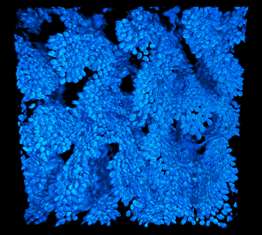| Laboratory systems | |
Mouse colon photomicrograph wins Nikon’s Small World competition21 November 2006 Nikon’s Small World competition has, for the first time since 2001, been won by a research scientist from the UK, Dr. Paul Appleton, from the Division of Cell and Developmental Biology, University of Dundee. With images produced from Dr Appleton's research into the development of colon cancer, the judges considered his work to stand out from over 1700 entries on the basis of originality, informational content, technical proficiency and visual impact.
Founded in 1974 to recognise excellence in photography through the microscope, Nikon’s Small World competition is the leading forum for celebrating the beauty and complexity of objects seen through the light microscope. Each year Nikon makes the images accessible to the public through a number of vehicles including the Nikon Small World calendar, a national museum tour, and an electronic gallery featured at www.nikonsmallworld.com. Commenting upon the entries to the competition, Eric Flem, Communications Manager, Nikon Instruments noted, “Each one of these photomicrographs awakens our sense of discovery. These images show us that another world exists just beyond our perceptible vision. It’s a world that connects us to everything around us – seen and unseen.” The distinguished list of judges for the 2006 Small World Competition include: Sir Harold Kroto, 1996 Nobel Laureate in Chemistry for his discovery of fullerenes which has opened up a new field of carbon chemistry; Cristina Scalet, Science Photo Editor for Time Magazine and Vladimir Gelfand, Professor of Cell and Molecular Biology, Feinberg School of Medicine, Northwestern University, amongst others. “Digital microscopy generates tremendous amounts of quantitative information which is used to measure changes in normal cells. This imaging capability makes an enormous difference in the amount and quality of the information we are able to collect and analyse,” said Dr. Appleton in reaction to his win.
|
